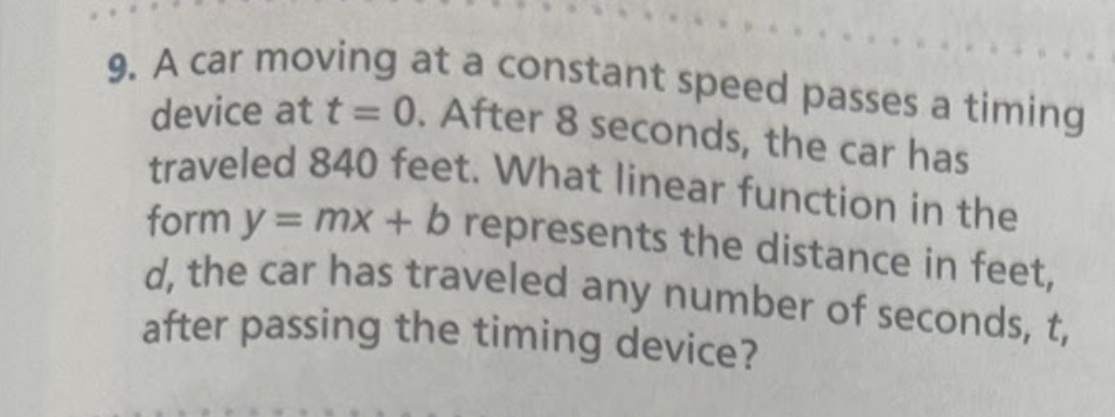A car moving at a constant speed passes a timing device at t = 0. After 8 seconds, the car has traveled 840 feet. What linear function in the form y = mx + b represents the distanc... A car moving at a constant speed passes a timing device at t = 0. After 8 seconds, the car has traveled 840 feet. What linear function in the form y = mx + b represents the distance, d, the car has traveled any number of seconds, t, after passing the timing device?

Understand the Problem
The question describes a scenario where a car moves at a constant speed and passes a timing device at time t=0. After 8 seconds, the car has traveled 840 feet. The goal is to find a linear function (in the form y = mx + b) that represents the distance the car has traveled in feet (d) after any number of seconds (t) since passing the timing device.
Answer
$d = 105t$
Answer for screen readers
$d = 105t$
Steps to Solve
- Identify the variables and the linear equation form
The problem asks for a linear function in the form $y = mx + b$, where in this case $y$ represents the distance $d$ and $x$ represents the time $t$. So, we want to find $d = mt + b$.
- Determine the y-intercept (b)
Since the car passes the timing device at $t = 0$, the initial distance is 0. This means the y-intercept $b$ is 0. The equation simplifies to $d = mt$.
- Calculate the slope (m)
We are given that after 8 seconds ($t = 8$), the car has traveled 840 feet ($d = 840$). We can use this information to find the slope $m$ (which represents the speed of the car). Substitute the values into the equation: $840 = m \cdot 8$
- Solve for m
Divide both sides of the equation by 8 to solve for $m$: $m = \frac{840}{8} = 105$
- Write the final equation
Now that we have the slope $m = 105$ and the y-intercept $b = 0$, we can write the linear function: $d = 105t$
$d = 105t$
More Information
The equation $d = 105t$ represents the distance the car has traveled after $t$ seconds. The car is traveling at a constant speed of 105 feet per second.
Tips
A common mistake is to forget that the car starts at a distance of 0 at time t=0, thus assuming $b$ is not 0. Another mistake is to incorrectly calculate the slope $m$ by dividing the time by the distance instead of dividing the distance by the time.
AI-generated content may contain errors. Please verify critical information